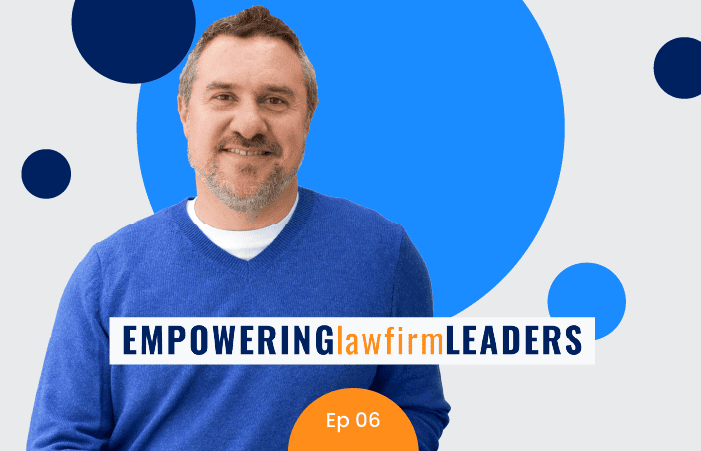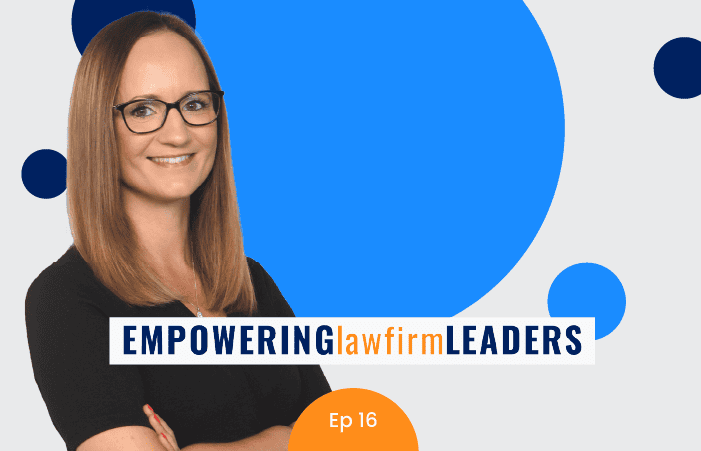Contents
How to transform your enquiry management to avoid losing revenue
In episode 20 of the Empowering Law Firm Leaders podcast, Shaun discusses the findings from the insight 6 ‘Truth and enquiry handling’ report and how firms are each losing £1.34 million a year. Shaun also discusses the significance of first impressions, the importance of follow-up, and advice for law firms looking to improve their client experience.
Shaun Cremins, Customer Experience Director at insight6, shares his insights on transforming a law firm’s enquiry management processes to improve conversion rate and increase revenue.
In this conversation we cover:
- The financial impact of poor enquiry handling
- Quick wins to transform your first impression
- Reviewing the client journey
- The importance of follow-up
- Leveraging technology for better client experience
insight 6 Enquiry Handling report
The client journey is a critical aspect of a law firm’s success, and insight6’s mystery shopper research sheds light on how well firms handle inquiries. Shaun explains, “The client journey is something we work consistently with firms on, all around the UK and Ireland. Every two or three years, we carry out market research focused on the enquiry stage.” This research involves making genuine enquiries to assess how empathetic and effective firms are in their communication and follow-up.
Shaun highlights the importance of the initial touchpoint, stating, “It’s really about understanding whether our researchers would genuinely feel they would use that firm.” The data collected helps firms understand their performance compared to others in the sector and identify areas for improvement. “Firms are potentially losing an awful lot of money purely based on that first touchpoint,” he adds.
Download the enquiry handling report here
The financial impact of poor enquiry handling
One of the most shocking statistics from the insight6 report is that law firms could be losing £1.34 million per year due to poor enquiry handling processes. Shaun acknowledges the assumptions behind this figure but stresses its significance: “It’s a startling stat. If a firm is losing a million-plus pounds worth of business just because they don’t have the process in place to handle that initial stage enquiry effectively, what could they do with that additional potential revenue?”
Shaun points out that many firms are content with their current conversion rates, but there is always room for improvement. “There’s a huge amount of opportunity to improve the overall experience,” he says. He emphasises the importance of training and ensuring that the team handling enquiries is well-informed and equipped to make a positive first impression.
Shaun suggests several quick wins for law firms. “Training as a first step is definitely a big win,” he advises. Ensuring that the people handling enquiries are well-trained and have the necessary tools is crucial. He also highlights the importance of cultural fit: “It’s about who you are as a firm. Some firms pride themselves on their family values and ability to empathise with clients, while others are more transactional.”
Shaun stresses the need for firms to understand their clients’ needs and deliver a personalised experience. “Less than 10% of clients will ever go back to a firm more than twice,” he notes, underscoring the importance of creating a strong emotional connection with clients. By focusing on the client journey and making improvements at every touchpoint, firms can enhance their reputation and drive growth.
How can firms improve their first impressions to increase conversion rates
Net Promoter Score (NPS) is a key metric for measuring client satisfaction and loyalty. Shaun explains, “NPS measures the likelihood of a client recommending the firm to a friend. A score of nine or 10 indicates a promoter, while anything less than seven is considered a detractor.” He notes that the legal sector’s NPS has improved but is still at a concerning minus 41.
Shaun attributes this low score to issues with communication, particularly in residential conveyancing. “The expectation of timeline is often not met, and it’s usually down to the communication piece,” he says.
“To improve NPS, firms need to focus on exceeding client expectations and ensuring that every touchpoint is handled effectively,” he advises. This involves not only meeting but surpassing client needs, which can significantly enhance their overall experience and likelihood of recommending the firm.
“Detractors could reach 3.5 thousand people because people share bad news stories more freely than they do good news stories,” he explains. Negative experiences can spread quickly and widely, damaging a firm’s reputation and deterring potential clients. Conversely, promoters can positively influence hundreds of people, making them invaluable for word-of-mouth marketing.
Reviewing the client journey
One of the most critical steps for law firms aiming to enhance their client experience is to thoroughly review their client journey. Shaun emphasises the importance of this process, noting that many firms claim to have reviewed their client experience, but lack a visual representation of it. “The majority will say yes, but there’ll be no visual representation of it,” he explains. Documenting the client journey and involving multiple people from across the firm in the process is essential for a comprehensive understanding.
Shaun advises starting with a detailed mapping of the client journey, which includes every touchpoint a client encounters from the initial enquiry to the final resolution. “Everyone thinks of probably five or six, maybe 10 headline touchpoints, but the reality is, if you do this effectively, you are talking about dozens,” he says. This involves considering all digital assets, social media content, website user experience, and any other interactions clients have with the firm.
About the speaker

Shaun Cremins is the Customer Experience Director at insight6, a company dedicated to helping businesses transform by delivering exceptional customer experiences. With extensive experience in the professional services sector, Shaun provides valuable insights into how law firms can improve their enquiry management processes to drive growth and success.
A thorough review should begin with the pre-client stage, examining how potential clients find and interact with the firm’s digital presence. Shaun shares an example of a recent project where outdated and irrelevant content was discovered on a client’s website. “We found several dozen pages that were either visible or hidden, that were no longer relevant,” he recalls. Ensuring that all online content is current and accurate is crucial for making a positive first impression.
Once a client engages with the firm, the focus shifts to communication and follow-up processes. Shaun highlights the importance of capturing client information accurately and using it to enhance the experience. “Big bone of contention and big frustration for clients is having to repeat themselves multiple times about the same scenario,” he notes. Implementing systems that allow for seamless information sharing and continuity in communication can significantly improve client satisfaction.
Shaun suggests involving a diverse group of employees in the client journey mapping process, including representatives from marketing, reception, secretarial teams, and any other departments that interact with clients. “Let’s get them into this conversation because a client map isn’t purely about how we handle a client. We need to consider pre-client and post-client,” he explains.
Finally, Shaun underscores the importance of continuous improvement. “It’s not an overnight plan. It’s not something we switch on tomorrow and say, we’re going to target this demographic,” he says. Regularly reviewing and refining the client journey allows firms to stay responsive to changing client needs and market conditions. By embedding client experience principles into the firm’s culture and operations, law firms can ensure they are consistently delivering the best possible service.
The importance of enquiry follow-ups
Shaun emphasises that follow-up is not just about responding to an initial enquiry but involves a series of proactive steps to ensure potential clients feel valued and supported throughout their decision-making process. The insight6 report found that only 14% of phone enquiries and just 8% of web enquiries are followed up.
Shaun explains that many firms misunderstand what constitutes an effective follow-up. “What we measure you on in terms of follow-up might be different to what you think follow-up is,” he says. Typically, firms believe that sending an email after an initial conversation constitutes follow-up. However, Shaun clarifies that this is still part of the enquiry stage. “In our world, that’s not the follow-up; that’s answering the enquiry,” he asserts.
True follow-up involves making a commitment to re-engage with the potential client within a specific timeframe. Shaun advises asking permission-based questions during the initial conversation to set the stage for future contact. Shaun highlights the importance of timing in follow-up. “Five working days, seven working days, ten working days—it’s frankly far, far too long in our experience,” he warns. Clients typically make decisions quickly, especially if they have an urgent need. Delayed follow-up can result in lost opportunities, as clients may choose another firm that responded more promptly.
“Many of the firms we’ve spoken to will say, ‘We don’t want to come across as pushy. We don’t want to harass them,'” he notes. However, Shaun advises that proactive follow-up, when done respectfully and with the client’s permission, is not pushy, but rather a demonstration of excellent client service. “If you say to me, ‘I’d much rather just leave me to make a decision,’ that’s absolutely fine as well, but we’ve asked the question, and we’ve made sure we’ve got those permissions in place,” he explains.
Maximise your marketing and business development efforts
Many reports state that SME law firms are planning to grow organically over the next few years. But, based on the stats in insight6’s mystery shopping report, additional efforts made in marketing and business development may be going to waste if enquiries aren’t effectively followed up and converted.
Shaun emphasises the importance of understanding the market and being targeted in marketing and business development efforts to maximise efforts and ensure firms don’t lose revenue. Shaun suggests that law firms should:
- Profile and target the right clients: Shaun advises firms to understand who their ideal clients are and where they can be found. This involves profiling potential clients and targeting marketing efforts to attract those specific demographics. “It’s understanding what your market is, who you’re trying to attract, being quite targeted in terms of marketing,” he said.
- Consistent and long-term approach: He highlights that marketing is not an overnight plan but requires consistency and a long-term strategy. “It’s not something we switch on tomorrow and say, we’re going to target this demographic,” Shaun explains.
- Data utilisation: Shaun stressed the importance of using data to understand which enquiries are converting and to refine marketing strategies accordingly. “Use data to your advantage. Be really specific about who you’re looking to attract, what enquiries are converting,” he recommends.
- Efficient enquiry handling: He points out that handling enquiries efficiently is crucial to ensure marketing efforts are not wasted. This includes making sure that enquiries are followed up promptly and effectively. “Make sure that you’re following that process of the enquiry management to make sure that none of those are missed,” Shaun advises.
- Refining the client journey: Shaun suggests that firms should continuously review and refine their client journey to ensure they are delivering the best possible experience. This involves understanding client preferences and making improvements at every touchpoint.
Unlocking growth through effective enquiry handling
Effective enquiry management is crucial for law firms aiming to thrive in today’s competitive landscape. By focusing on the client journey, improving communication, and leveraging technology, firms can significantly enhance their client experience and avoid losing valuable business opportunities.
The insight6 research highlights startling figures of the revenue being lost by law firms, yet simple enquiry management process improvements can provide a competitive edge and ensure firms are positioned to succeed and stand out in the market.
Watch the full interview with Shaun Cremins now to discover more advice and guidance on enhancing client services and winning new business. You’ll also hear Shaun’s exclusive advice on the behaviours, habits, and tools that sets successful law firms apart.ld be implemented to mitigate risk and the behaviours that set the successful, competitive law firms apart.




